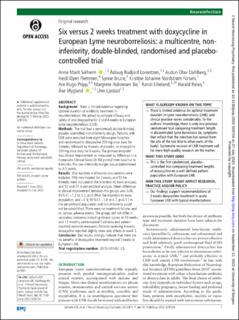| dc.contributor.author | Solheim, Anne Marit | |
| dc.contributor.author | Lorentzen, Åslaug Rudjord | |
| dc.contributor.author | Dahlberg, Audun Olav | |
| dc.contributor.author | Flemmen, Heidi Øyen | |
| dc.contributor.author | Brune, Synne | |
| dc.contributor.author | Forselv, Kristine Johanne Nordstrøm | |
| dc.contributor.author | Pripp, Are Hugo | |
| dc.contributor.author | Bø, Margrete Halvorsen | |
| dc.contributor.author | Eikeland, Randi | |
| dc.contributor.author | Reiso, Harald | |
| dc.contributor.author | Mygland, Åse Daasvand | |
| dc.contributor.author | Ljøstad, Unn | |
| dc.date.accessioned | 2022-09-14T12:22:02Z | |
| dc.date.available | 2022-09-14T12:22:02Z | |
| dc.date.created | 2022-08-11T16:02:41Z | |
| dc.date.issued | 2022 | |
| dc.identifier.issn | 0022-3050 | |
| dc.identifier.uri | https://hdl.handle.net/11250/3017836 | |
| dc.description.abstract | Background
There is limited evidence regarding optimal duration of antibiotic treatment in neuroborreliosis. We aimed to compare efficacy and safety of oral doxycycline for 2 and 6 weeks in European Lyme neuroborreliosis (LNB).
Methods
The trial had a randomised, double-blinded, placebo-controlled, non-inferiority design. Patients with LNB were recruited from eight Norwegian hospitals and randomised to doxycycline 200 mg once daily for 2 weeks, followed by 4 weeks of placebo, or doxycycline 200 mg once daily for 6 weeks. The primary endpoint was clinical improvement as measured by difference in a Composite Clinical Score (0–64 points) from baseline to 6 months. The non-inferiority margin was predetermined to 0.5 points.
Results
One hundred and twenty-one patients were included. Fifty-two treated for 2 weeks and 53 for 6 weeks were included in the intention-to-treat analyses, and 52 and 51 in per-protocol analysis. Mean difference in clinical improvement between the groups was 0.06, 95% CI −1.2 to 1.2, p=0.99 in the intention-to-treat population, and −0.4, 95% CI −1.4 to 0.7, p=0.51 in the per-protocol population and non-inferiority could not be established. There were no treatment failures and no serious adverse events. The groups did not differ in secondary outcomes including clinical scores at 10 weeks and 12 months, cerebrospinal fluid data and patient-reported outcome measures. Patients receiving 6 weeks doxycycline reported slightly more side effects in week 5.
Conclusion
Our results strongly indicate that there are no benefits of doxycycline treatment beyond 2 weeks in European LNB. | en_US |
| dc.language.iso | eng | en_US |
| dc.publisher | BMJ Publishing Group | en_US |
| dc.rights | Navngivelse-Ikkekommersiell 4.0 Internasjonal | * |
| dc.rights.uri | http://creativecommons.org/licenses/by-nc/4.0/deed.no | * |
| dc.title | Six versus 2 weeks treatment with doxycycline in European Lyme neuroborreliosis: a multicentre, noninferiority, double-blinded, randomised and placebocontrolled trial | en_US |
| dc.type | Journal article | en_US |
| dc.type | Peer reviewed | en_US |
| dc.description.version | publishedVersion | en_US |
| dc.rights.holder | Copyright Author(s) (or their employer(s)) 2022. | en_US |
| cristin.ispublished | true | |
| cristin.fulltext | original | |
| cristin.qualitycode | 2 | |
| dc.identifier.doi | 10.1136/jnnp-2022-329724 | |
| dc.identifier.cristin | 2042530 | |
| dc.source.journal | Journal of Neurology, Neurosurgery and Psychiatry | en_US |
| dc.identifier.citation | Journal of Neurology, Neurosurgery and Psychiatry, 2022. | en_US |

